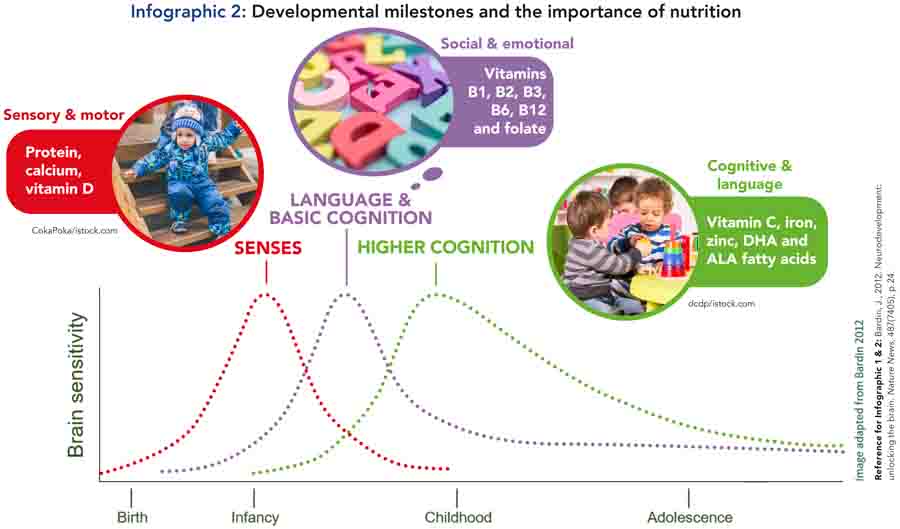1. Adequate Nutrition

Nutrition plays a vital role in children’s growth and development. Providing a nutrient-dense diet for your child can reduce the risk of developmental delay.
- At around 12 months old, a child begins to walk. Eating food high in protein, calcium, magnesium and vitamin D can help to build bones and muscles so that the toddler has the strength to support their weight.
- A range of B Vitamins, such as vitamin B3 (niacin) is required to support the proper functioning of a child’s nervous system.
- Vitamins B1, B6 and B12 contribute to the psychological functions of a child as it can be stressful for toddlers as they face so many new challenges as they grow and learn.
- Vitamin A is essential for visual development, while cognitive development is supported by iron, zinc, and vitamin C.
2. Ensure Regular Physical Activity
Instead of letting your children sit in front of the television for hours and hours, it would be more exciting for them to go outdoors and do some sports. Young children need regular physical activity for them to grow well. This includes activities like running, hopping, jumping, throwing, catching, and kicking. Parents should introduce children to new movements in creative ways and provide opportunities for them to practice. Sports activities help the body to build strong muscles and improve motor skills. Research has found that children who engaged in moderate to vigorous physical activity (which are activities that make you sweat and breathe harder than normal) regularly have better motor skills. Exercise can also increase the levels of brain-derived neurotrophic factor (BDNF), an agent that facilitates learning and helps with cognitive function. With proper exercise, children will be able to grow well and reach milestones on time or early.
3. Have a reliable, responsive, and warm parent-child relationship: The baby needs you!
The quality of interaction between parent and child is the most crucial factor to a child’s development. It is important to let your children be surrounded by love, safe and nurturing adults who they can always rely on. As a parent, you need to give lots of attention and affection to your child, as the quality of care they receive determines their intellectual, social, and emotional development. One way is to engage consistently with your baby through sounds, words, and play. For example, when you are baking and he/she says “yum yum”, you can respond by saying, “Yes, this is a delicious bread. It smells so good! Yum, yum!”
4. Create a safe and supportive social environment
Having positive relationships with friends and neighbours can help with a child’s development. A child’s Children’s development is also influenced by their neighbourhoods as they spend much time in these environments. For example, having a positive relationship with friends and neighbours for the child to interact with can stimulate him both mentally and physically. It is important to have a safe environment in the neighbourhood for them to play and explore. A child can also be benefited if they have access to facilities like playgrounds and parks which increase their motivation to be active outside.
5. Introduce music to your child
It is scientifically proven that exposing children to music during early development helps them with their physical (motor), cognitive, language and socioemotional skills. There are many ways parents and the child can interact with music, such as listening, singing and dancing.
Benefits of Music:
- Cognitive Development
Music is a perfect channel for children to learn basic concepts in a fun way. For example, learning body parts by listening to songs like “Head, Shoulders, Knees, and Toes.”
- Motor Development
Clapping and dancing to music teach children motor coordination, body awareness and timing, while performing the hand gestures for songs like “Itsy Bitsy Spider” helps children to develop fine motor skills.
- Language Development
Music helps babies to develop language when babies babble the musical tune. It was found that babies who engage in music frequently are likely to speak early.
- Social and Emotional Development
Music stimulates the release of oxytocin (the “bonding” hormone). Listening to music together can strengthen the bonding between parents and the child.
“A JOURNEY OF THOUSAND MILES BEGIN WITH A SINGLE STEP”
-LAO TZU-
Article written by Teoh Jing Qi. A current Psychology student that is passionate about students and the education field.






